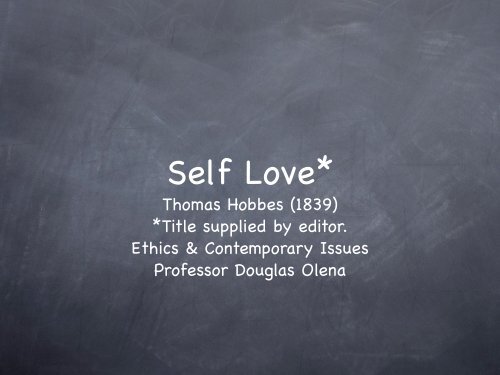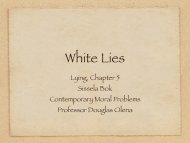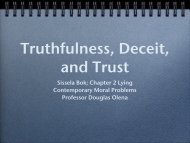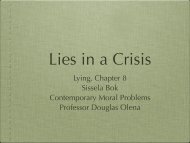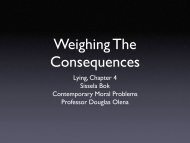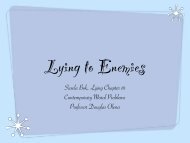Thomas Hobbes: Self Love - Olena's
Thomas Hobbes: Self Love - Olena's
Thomas Hobbes: Self Love - Olena's
You also want an ePaper? Increase the reach of your titles
YUMPU automatically turns print PDFs into web optimized ePapers that Google loves.
<strong>Self</strong> <strong>Love</strong>*<br />
<strong>Thomas</strong> <strong>Hobbes</strong> (1839)<br />
*Title supplied by editor.<br />
Ethics & Contemporary Issues<br />
Professor Douglas Olena
Motion 39<br />
<strong>Hobbes</strong> in a classical style of explanation shows the<br />
route from which our ordinary desires proceed.<br />
He shows how the animal motions produce human<br />
Endeavor.<br />
40 Then endeavor is split into two types;<br />
Appetite or Desire<br />
Aversion
Motion 40<br />
“That which men desire, they are said to LOVE: and<br />
to HATE those things for which they have aversion.”<br />
“Those things which we neither desire, not hate, we<br />
are said to contemn; CONTEMPT being nothing else<br />
but an immobility…[or rebellion] of the heart in<br />
resisting the actions of certain things.<br />
Our appetite, aversion and contempt may change<br />
because of the continual changeability of human<br />
dispositions.
Values 40<br />
Whatever man desires, he calls good; the object of<br />
his hate and aversion evil; the object of his contempt,<br />
vile and inconsiderable.<br />
<strong>Hobbes</strong> takes it that good, evil and contemptible are<br />
only descriptions of our sentiment, not some<br />
description of the object’s nature.<br />
“Felicity of this life consisteth not in the repose of a<br />
mind satisfied. There is no such… utmost aim,… or<br />
greatest good.”
Values 40<br />
Man is inclined to desire power, but is not satisfied<br />
with it.<br />
Each gain of power is accompanied by the desire for<br />
more.<br />
A man dies when he no longer desires anything.
Equality and Competition 41<br />
With respect to man’s mind, he is equal with others<br />
in prudence, which <strong>Hobbes</strong> defines as experience.<br />
Contentment with one’s share is the sign of equality.<br />
“From this equality of ability, ariseth equality of hope<br />
in the attaining of our ends.<br />
When two desire the same thing that they both<br />
cannot enjoy, they become enemies.”
Competition and Diffidence<br />
41<br />
Enemies attempt to destroy or subdue one another.<br />
But the conqueror is always vulnerable to be<br />
conquered.<br />
“And from this diffidence of one another, there is no<br />
way for any man to secure himself.”<br />
Whatever measures a man must take to secure<br />
himself should be allowed, even conquest.
Diffidence and Glory 41<br />
That gives no pleasure, rather grief in that there is<br />
no power to overawe one’s contemporaries.<br />
“Everyone looks to others to value him even as he<br />
values himself.”<br />
If someone contemns him, he either makes an<br />
example of or destroys him.
Causes of Quarrel 41<br />
Competition:<br />
One invades another for gain.<br />
Diffidence:<br />
One invades for safety.<br />
Glory:<br />
One invades for reputation.
War 41<br />
There is war when there is no one to overawe<br />
them in power.<br />
It is every man against every man.<br />
“So the nature of war consisteth not in actual<br />
fighting; but in the known disposition thereto,<br />
during all the time there is no assurance to the<br />
contrary.”
War 41<br />
For example, the cold war between the Soviets and<br />
the U.S. or the war on terror.<br />
“All other time is PEACE.”
War 42<br />
During war, there is no place for industry because of<br />
uncertainty, no culture, no navigation, nor imports of<br />
commodities, no commodious building, no knowledge,<br />
no account of time, no arts, no letters, no society and<br />
there is continual fear and the danger of violent<br />
death.<br />
“…and the life of man, solitary, poor, nasty, brutish<br />
and short…”
War 42<br />
It is not always that bad, but when there is a<br />
continual fixation on warlike activities, the entire<br />
culture suffers and individuals in it.<br />
“All society therefore is either for gain, or for glory;<br />
that is, not so much for love of our fellows, as for<br />
the love of ourselves.”<br />
No society which begins with vain glory can last, for<br />
if everyone has honor, then no one has it. Those<br />
individuals persist only by comparison with their<br />
inferiors.
Society 42<br />
If there were no fear in men, society would proceed<br />
by domination rather than by egalitarian society.<br />
“We must therefore resolve, that the original of all<br />
great and lasting societies consisted not in the<br />
mutual goodwill men had towards each other, but in<br />
the mutual fear they had of each other.”
Society 42<br />
Men are equals in strength.<br />
Society exists in the tension of that equality by<br />
stipulating leadership by the civil law.<br />
We should therefore not look scornfully on self care<br />
or preservation.<br />
“It is… neither absurd nor reprehensible, neither<br />
against the dictates of true reason, for a man to use<br />
all his endeavors to preserve and defend his body<br />
and the members thereof from death and sorrows.”
Our Rights 43<br />
“Therefore the first foundation of natural right is<br />
this, that every man as much as is in him lies<br />
endeavor to protect his life and members.”<br />
“He must also be allowed a right to use all the<br />
means, and do all the actions, without which he<br />
cannot preserve himself.”
Our Rights 43<br />
All other rights are given to him by nature for man<br />
to do as he wishes for his own profit.<br />
By this we conclude “that in the state of nature, to<br />
have all and do all, is lawful for all.”<br />
“…that in a state of nature, profit is the measure of<br />
right.”
Conflict 43<br />
However the conflict arises because every man has a<br />
right to the same things. So one has the right to<br />
something, the other a right to resist his taking it.<br />
War is the state of conflict where by words or deeds,<br />
men are in a contest of wills to acquire what they<br />
deem good.


